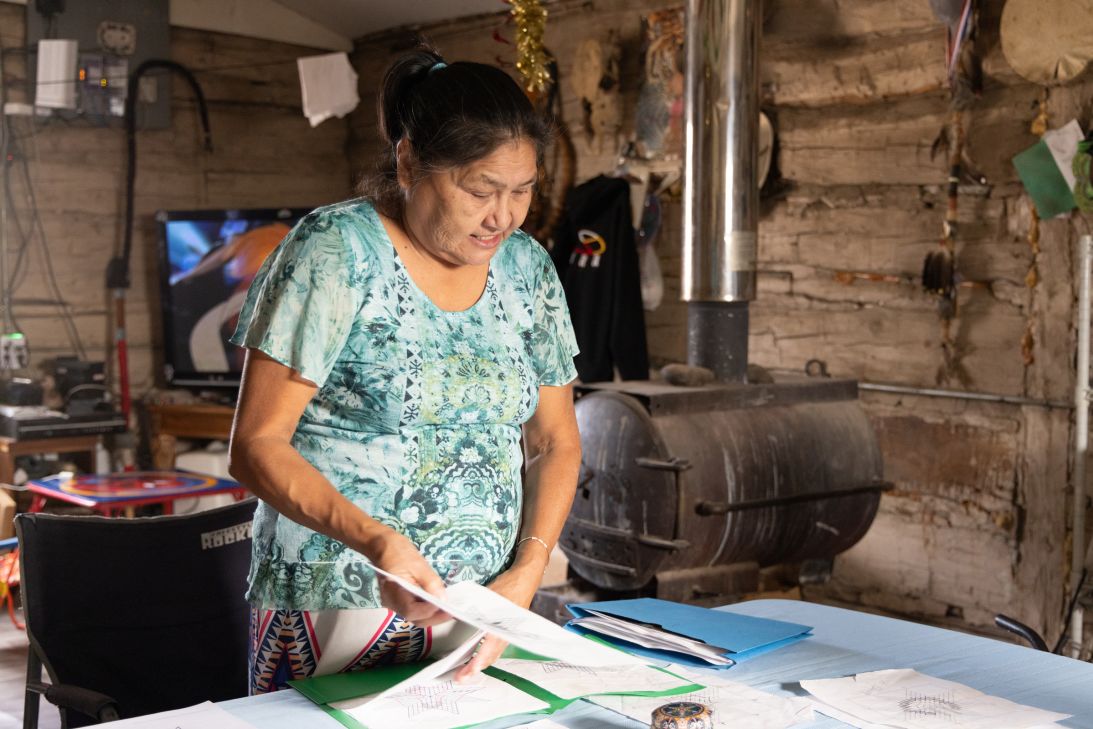Business
Community Faces Crisis as SNAP Cuts Leave Residents in Despair

Residents of the Pine Ridge Reservation in South Dakota are facing a dire situation as funding from the Supplemental Nutrition Assistance Program (SNAP) dwindles due to a federal government shutdown. This economically challenged community, which is home to over 20,000 people, is grappling with food scarcity as options become increasingly limited. Many families are expressing profound concern about their ability to survive as they run low on essential supplies.
Chiffon Two Bulls, a 38-year-old single mother of four, shared her fears: “It’s really going to hurt a lot of families; a lot of people depend on it like myself, my kids.” With just a few essentials left at home, she worries about the future and the impact on her children. The situation has intensified following a recent federal court ruling that ordered the government to fully fund SNAP benefits for November, a ruling that is currently under appeal.
The Pine Ridge Reservation, spanning over 2.1 million acres, is marked by significant economic hardship. Poverty and unemployment rates are extremely high, with estimates suggesting that over 80% of residents in some areas are affected. Jake Little, director of food distribution for the Oglala Sioux Tribe, noted, “Every social index you could think of, we’re on the bad end of that.” The sole grocery store, Buche Foods, serves a vast region, and its owner, RF Buche, has highlighted the struggle of operating in an area where food prices are inflated due to the isolation of the community.
Buche pointed out the stark price disparities between his store and larger retailers. “Why is it when my wholesaler’s truck backs up to General Mills at the same time Walmart’s does for an 18-ounce Cheerios, $6 is my cost before I put a markup on it, and Walmart’s is sitting on the shelf at $4.38?” The challenges of food access are compounded by the lack of transportation options, making it difficult for residents to reach alternative grocery stores located over 45 minutes away.
As winter approaches, many families are bracing for even tougher times. Katherine Water, a 59-year-old great-grandmother, struggles to make her way to Buche Foods due to car troubles. She relies on others for transportation or walks the four miles to the store. Water, who has health issues, is also facing additional challenges with her water supply, as her home’s well pump has been out of service for months. “It’s kind of tough right now,” Water said, emphasizing the difficulty of managing daily needs.
Her brother, Nathaniel Waters, finds himself in a similarly precarious situation. After losing his stable job earlier in the year, he has faced challenges in securing new employment. His SNAP benefits, which were previously around $268 per month, have now been reduced to $168, creating additional strain on his household. “I was told I needed to find a job; and around here, it’s hard to find a job,” he remarked.
The looming winter season adds urgency to the residents’ plight. Two Bulls, who has seen her SNAP benefits drop dramatically, expressed her concern about the harsh weather and the financial burden of heating her home. The trailer she lives in, provided by FEMA after a tornado over a decade ago, is in disrepair and struggles to withstand the elements.
In an effort to mitigate the impact of the SNAP cuts, local organizations are stepping up. Buche has initiated a fundraising campaign through his nonprofit, Team Buche Cares, to distribute $100 grocery certificates to families affected by the loss of SNAP benefits. Additionally, the Conscious Alliance Food Sovereignty Center is increasing its distribution efforts, although its capacity remains limited. “The food pantry can’t close the gap of SNAP,” said Natalie Hand, the center’s field director. “We can provide one meal to SNAP’s nine. We just can’t fill that gap.”
The Oglala Sioux Tribe is also responding to the crisis, navigating frozen funding for essential programs. The Food Distribution Program on Indian Reservations (FDPIR) is one such initiative, but many families are facing a choice between SNAP and commodity assistance. Little noted that the commodity warehouse serves about 90 to 100 households daily, but the number of families seeking assistance has surged due to the SNAP cuts.
Oglala Sioux Tribe President Frank Star Comes Out has emphasized the treaty obligations that the U.S. government has failed to uphold. “Our people gave up land so that [the U.S. government] can make millions and billions of dollars off it, but you cannot live up to your treaty obligations,” he stated. The tribe has reached out to various government authorities for assistance, but many have not responded.
As the community grapples with these challenges, residents are expressing their fears and frustrations. Anna Halverson, a tribal council representative, shared that some families are anxious about how they will feed their children. “It’s difficult to come up with a solution. It’s difficult to tell families you’re going to be OK,” she said.
Despite the overwhelming adversity, community leaders like Star Comes Out remain hopeful about their culture’s resilience. “We may be in poverty, but we’re strong in culture,” he asserted. “That’s what keeps us alive.” As the situation continues to evolve, the Pine Ridge community stands at a crossroads, grappling with the immediate need for food security and the long-term struggle for recognition and support.
-

 Top Stories1 month ago
Top Stories1 month agoRachel Campos-Duffy Exits FOX Noticias; Andrea Linares Steps In
-

 Top Stories1 week ago
Top Stories1 week agoPiper Rockelle Shatters Record with $2.3M First Day on OnlyFans
-

 Top Stories6 days ago
Top Stories6 days agoMeta’s 2026 AI Policy Sparks Outrage Over Privacy Concerns
-

 Sports5 days ago
Sports5 days agoLeon Goretzka Considers Barcelona Move as Transfer Window Approaches
-

 Top Stories1 week ago
Top Stories1 week agoUrgent Update: Denver Fire Forces Mass Evacuations, 100+ Firefighters Battling Blaze
-

 Top Stories1 week ago
Top Stories1 week agoOnlyFans Creator Lily Phillips Reconnects with Faith in Rebaptism
-

 Top Stories5 days ago
Top Stories5 days agoWarnock Joins Buddhist Monks on Urgent 2,300-Mile Peace Walk
-

 Entertainment6 days ago
Entertainment6 days agoTom Brady Signals Disinterest in Alix Earle Over Privacy Concerns
-

 Top Stories7 days ago
Top Stories7 days agoOregon Pilot and Three Niece Die in Arizona Helicopter Crash
-

 Top Stories4 days ago
Top Stories4 days agoCBS Officially Renames Yellowstone Spin-off to Marshals
-

 Health2 months ago
Health2 months agoTerry Bradshaw Updates Fans on Health After Absence from FOX NFL Sunday
-

 Sports4 days ago
Sports4 days agoSouth Carolina Faces Arkansas in Key Women’s Basketball Clash




